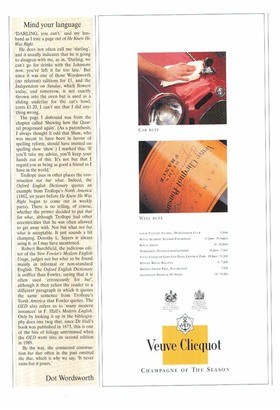Mind your language
'DARLING, you can't,' said my husband as I tore a page out of He Knew He Was Right.
He does not often call me 'darling', and it usually indicates that he is going to disagree with me, as in, 'Darling, we can't go for drinks with the Johnsons now, you've left it far too late.' But since it was one of those Wordsworth (no relation) editions for £.1, and the Independent on Sunday, which flowers today, and tomorrow, is not exactly thrown into the oven but is used as a sliding underlay for the cat's bowl, costs £1.20, I can't see that I did anything wrong.
The page I disbound was from the chapter called 'Shewing how the Quar rel progressed again'. (As a parenthesis, I always thought it odd that Shaw, who was meant to have been in favour of spelling reform, should have insisted on spelling show `shew'.) I marked this: 'If you'll take my advice, you'll keep your hands out of this. It's not but that I regard you as being as good a friend as I have in the world.'
Trollope uses in other places the construction not but what. Indeed, the Oxford English Dictionary quotes an example from Tro!lope's North America (1862, six years before He Knew He Was Right began to come out in weekly parts). There is no telling, of course, whether the printer decided to put that for what, although Trollope had other eccentricities that he was often allowed to get away with. Not but what not but what is acceptable. It just sounds a bit clumping. Dorothy L. Sayers is always using it, as I may have mentioned.
Robert Burchfield, the judicious editor of the New Fowler's Modern English Usage, judges not but what to be found mainly in informal or non-standard English. The Oxford English Dictionary is sniffier than Fowler, saying that it is
often used 'erroneously for but', although it then refers the reader to a
different paragraph in which it quotes the same sentence from Troilope's North America that Fowler quotes. The OED also refers us to 'many modern instances' in F. Hall's Modern English. Only by looking it up in the bibliogra phy does one twig that, since Dr Hall's book was published in 1873, this is one of the bits of foliage untrimmed when the OED went into its second edition in 1989.
By the way, the connected construction but that often in the past omitted the that, which is why we say, 'It never rains but it pours.'
Dot Wordsworth






















































































 Previous page
Previous page